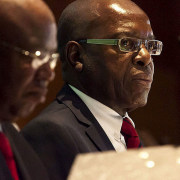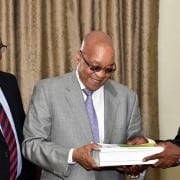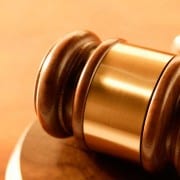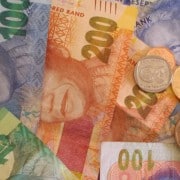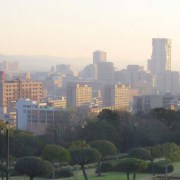|
Getting your Trinity Audio player ready...
|
 The 2014 Index of Economic Freedom, published recently by Washington’s Heritage Foundation in partnership with the Wall Street Journal, shows that corruption in South Africa is having an impact on economic freedom in the country.
The 2014 Index of Economic Freedom, published recently by Washington’s Heritage Foundation in partnership with the Wall Street Journal, shows that corruption in South Africa is having an impact on economic freedom in the country.
The index probes 10 freedoms in 186 countries and for the 2014 survey, most data covers the second half of 2012 and the first half of 2013.
The freedoms in question are grouped into four broad categories, or pillars, of economic freedom. They are:
> Rule of Law (property rights, freedom from corruption);
> Limited Government (fiscal freedom, government spending);
> Regulatory Efficiency (business freedom, labour freedom, monetary freedom); and
> Open Markets (trade freedom, investment freedom, financial freedom).
This year's report included a special focus on Rule of Law, which encompasses freedom from corruption. One of the chapters in this section, Good Business Demands Good Governance, states that "societies that have stable, predictable, and transparent institutions enjoy investor confidence and economic growth".
South Africa scored 62.5 for 2014, which puts it into 75th place, and the “moderately free” category, in terms of economic freedom. The country scored 0.7 points higher than in 2013, and it places sixth out of the 48 countries in sub-Saharan Africa. Its overall score is higher than the world average of 60.3 and the regional average of 54.6.
Sub-Saharan Africa was determined to be the world’s second most improved region in terms of economic freedom as measured by the index.
It found that there were gains for South Africa in only two of the 10 indicators – investment freedom and freedom from corruption. In two freedoms (property rights, financial freedom) the score remained unchanged, and in the remaining six South Africa declined.
One of the weak points, according to the index, is that enforcement of anti-corruption statutes is inadequate. The country has ample legislature to fight corruption but lack of efficient implementation and enforcement are letting its citizens down.
Further, notes the index, public servants often do not declare their business interests as required by law. Another factor dragging down South Africa’s economic freedom is that the public procurement process is “often politically driven and opaque”, and service delivery, which is linked to corruption, is “undermined by poor administration”.
Corruption erodes economic freedom by introducing insecurity and uncertainty into economic relationships, says the index. It used data from Transparency International’s Corruption Perceptions Index for 2011, which measured the level of corruption in 183 countries, to arrive at the scores.
Another indicator of interest to Corruption Watch is that of government spending, which falls in the category of Limited Government. Government expenditures equal 32% of GDP, while public debt amounts to around 42% of the domestic economy.
The index uses a non-linear scale for scoring government spending, so that government spending that is close to zero is lightly penalised, while levels of government spending that exceed 30% of GDP lead to much worse scores in a quadratic fashion – doubling the spending yields four times less freedom.
Towards the end of 2013 finance minister Pravin Gordhan announced a series of strict measures which were aimed at reining in the runaway level of government spending observed in recent years.
Browse the index to see South Africa’s full assessment.
Economic freedom
Each of the ten economic freedoms within the four categories is graded on a scale of 0 to 100. A country’s overall score is the average of these ten economic freedoms, with equal weight being given to each.
The foundation defines economic freedom as “the fundamental right of every human to control his or her own labour and property. In an economically free society, individuals are free to work, produce, consume, and invest in any way they please. In economically free societies, governments allow labour, capital and goods to move freely, and refrain from coercion or constraint of liberty beyond the extent necessary to protect and maintain liberty itself.”
South Africa scored its highest mark in 2003 and in the decade since there has been no further progress.
“Economic freedom in the [sub-Saharan] region’s largest economy, South Africa, has declined over the past decade, dimming hopes for a more prosperous and stable future on the African continent’s southern tip,” said index editor Terry Miller.
However, over the 20 years of its inclusion in the index, South Africa’s economic freedom score has advanced by 1.8 points. Progress has been curtailed by declines in freedom from corruption, business freedom, and investment freedom, meaning that the economy has not budged from being rated “moderately free.”
South Africa was in danger of “falling away from economic freedom and prosperity,” said Miller.


